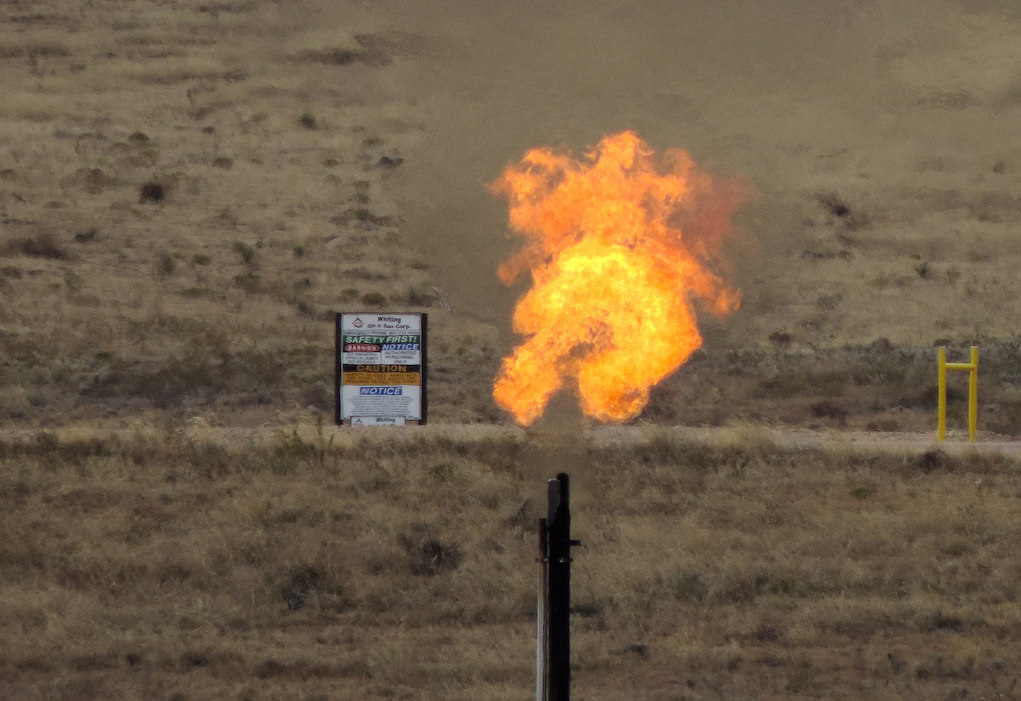Methane released from oil and gas operations in Alberta represents lost natural gas royalties of up to $21 million a year and lost Alberta carbon tax revenues of as much as $2.3 billion yearly, according to a briefing note released yesterday by the Pembina Institute.
On their own, the foregone royalties, lost when oil and gas companies allow natural gas to escape through undetected leaks or intentional venting, would be enough to pay the annual salaries of 180 newly employed nurses, build 25 new schools, or construct 420 new playgrounds, the advocacy organization Progress Alberta said this morning.
According to the note from the Pembina Institute — an energy issues think-tank founded in Alberta in 1985 — recent research by Carleton University using measuring instruments on aircraft indicates that Alberta releases of methane are likely 25 to 50 per cent higher than currently reported. Methane is a potent greenhouse gas that is the main component of natural gas. Other studies elsewhere in the world have made similar findings.
Since the industry reported emitting approximately 30 million tonnes of carbon dioxide equivalent, that would mean 38 to 45 million tonnes were actually emitted by the Alberta oil and gas industry. So right off the top, the Pembina briefing note argues, “wasted methane represents lost value to oil and gas operators due to lost sales volumes of natural gas, and lost value to the government through lost royalty collection.”
“Based on the Carlton University research, annual lost sales from all methane releases in the Alberta oil and gas sector are roughly between $213 million and $253 million, with lost royalty estimated at between $17 million and $21 million,” the briefing note concluded.
Since Alberta’s carbon levy doesn’t apply to wasted natural gas under the NDP government’s Climate Leadership Plan, no tax is applied to these releases. If the carbon levy were applied, they would generate up to $1.4 billion at $30 a tonne and up to $2.3 billion at $50 a tonne, Pembina’s note said.
Under the Alberta Climate Leadership Plan, oil and gas companies were excused from the carbon tax because they made a commitment to curb methane emissions by 45 per cent by 2025. However, according to Progress Alberta Executive Director Duncan Kinney, “as a result of industry foot dragging, those regulations are still not in place.”
Reports in the business press last fall suggest this interpretation is correct. The Financial Post reported in November that negotiations among the Alberta government, industry and environmental groups broke down last summer. “Central to the dispute was industry’s claim that government should not prescribe which sources of methane emissions it should be forced to measure and reduce.”
According to Progress Alberta’s statement this morning, “Albertans are losing money and the oil companies continue to put what is convenient to them ahead of what is good for Alberta.” The group called for industry to have to pay the carbon tax on such emissions, “like every citizen in Alberta does on their home heating natural gas, gasoline or diesel.”
In May last year, in an announcement of new regulations to reduce methane emissions and air pollution across Canada by Environment Minister Catherine McKenna, the Canadian government said “reducing methane emissions is one of the lowest-cost actions Canada can take to reduce greenhouse gases.”
McKenna said Ottawa’s intention was to reduce methane emissions by 40 to 45 per cent by 2025, aiming “to catch up on the action taken by such U.S. states as California, Colorado, and North Dakota.”
The federal Liberal government’s plan announced by McKenna allowed provinces and territories to develop their own regulations to replace the federal ones if they can achieve similar outcomes.
While natural gas is a valuable natural resource that all Albertans own, “the only time that Albertans get paid for this resource is when oil and gas companies pay royalties to the provincial government,” Kinney observed.
“Without regulations, there’s little incentive for companies to restrict the venting and leaking of natural gas and money that could be going to schools, playgrounds and nurses is instead just floating away into the atmosphere making climate change even worse,” he concluded.
This post also appears on David Climenhaga’s blog, AlbertaPolitics.ca.
Photo: WildEarth Guardians/flickr
Like this article? rabble is reader-supported journalism. Chip in to keep stories like these coming.





